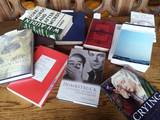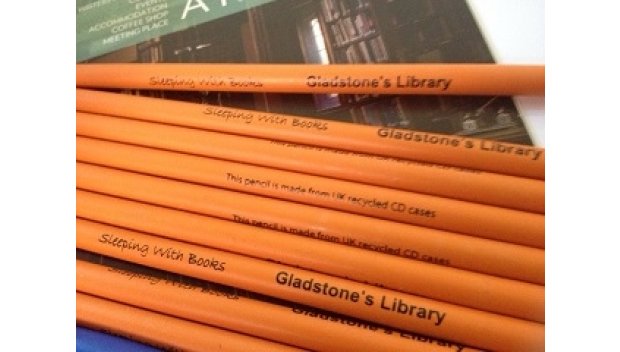I like the motto on the orange pencils (made out of CD cases) which you can buy at Reception. I couldn’t believe my luck at getting a chance to try. I’d half-wondered if it was the prosecco talking when my predecessor, Lesley McDowell, said her residency had been one of the nicest months of her life. But no. That’s how it was.
I came here to write poems for my second collection. I also came to read in two different ways. One was to trace some images which haunted me into anthropology and down other trails. The other was deliberately unpurposive – to let books find me. What better place, given the quirkiness and range of the collections at Gladstone’s Library?
I had a really fruitful writing month in the History Room’s dark wooden coolness, whilst outside the sun blazed everything to bright green. Writing poems always surprises (and sometimes shocks), but I was as surprised about the blossoming of books in my hands. It was like having your teenage hunger for reading returned to you, still in its packaging. It’s hard to understate this freshness, however odd it may sound coming from someone whose life is spent writing, and – of course – doing the reading that both feeds, and teaches you about, writing, the reading you can’t live without doing.
Here’s a picture of my desk, full of treasures.

They were picked on impulse from the Annexe’s strangely mobile stacks, and from among Gladstone’s own books because they were at eye-level as I worked or drew me as I ambled to my desk. I read poetry, novels, memoir, anthropology, sociology, technology, psychology, economics. I was filled with greed (matched only by my enthusiasm for the food produced by the fantastic staff of Food For Thought). Even looking at this picture makes me happy, representing as it does the mixing of aspiration and satisfaction, the lovely library hunger that can never quite be sated, so you can go on eating (oops, I meant reading) forever.
I’m still trying to frame how the Library reinvented reading for me. It’s a need, of course but normally I read a lot to learn things I want to know, feeling time is pressing on a self-education programme at which I seem to be lagging. Oddly, Gladstone’s own book-appetite was inspiring, not crushing, and I liked too those peaceful times in the Gladstone Room with the interns, all of us lost in our books, occasionally breaking off for a chat or a cup of tea. Perhaps it was the generosity of the community here (and, indeed, of the offer of the residency in the first place), but reading became play again – utterly serious and yet not serious at all. And play always leads to poems.
Missed connections, unlikely connections and the magic of random and coincidental linkages all provide gaps across which the electricity of a poem can leap and sizzle. I read about debt, about the cutting of precious stones, about demon possession, about sex (further volumes of Havelock Ellis on a borrowed Kindle for £0.00 will not be the same), about cities, about ventriloquism, about crying. I was surprised how these disparate topics nosed their way into poems that started being about something else.
Yes, it was ‘sleeping with books’. I woke every day at six am to the simple awareness of their siren pages riffling on the bedside table (as well as to some slightly bizarre bird sounds). I went away with a list of books I wanted to finish, and another list of recommendations from the fascinating staff and guests of the Library. Everything felt new again, and nothing is more precious to a poet. Thank you so much.
Judy Brown.
